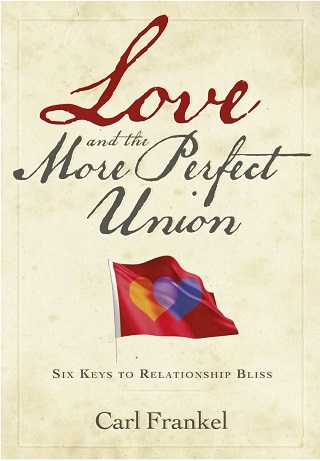| "When I saw the lipstick on your collar, the story I told myself was that you'd been fooling around with Denise."
It is one of the most beautiful compensations of this life that no man can sincerely try to help another without also helping himself. - Ralph Waldo Emerson
It's one thing to vow never to have a screaming match with your partner...
Having these 11 simple guidelines to communicate consciously enables you both to win.
Chances are that the models you've had (movies, your parents) didn't teach you safe communication.

CONSCIOUS COMMUNICATION
So here are a few of the most powerful communication keys collected by Carl Frankel, my friend and author of "Love and The More Perfect Union."

Carl says conscious communication protocols don't come naturally and we need to practice them. They are the difference between litigation and mediation. Litigation is win-lose. Mediation is win-win.
RELATIONSHIP WELL-BEING
- Kindness breeds togetherness.
- Negativity takes us toward hell, positivism toward heaven.
- Venting negative emotions generates fear and mistrust. So no dumping of anger, ever.
- Feel good neuro-chemicals are generated by how we treat ourselves and our partner.
The general requirements for safe communication come from myriad relationship books and include:
EMPATHIC LISTENING
Shut up and walk a mile in their shoes.
Mirroring your partner's words until they feel genuinely heard.
Do you understand what they are saying? Repeat and see.
Identifying the meanings you attribute to your partner's behavior as stories you're telling yourself, not the objective truth about what's going on.
When we get into, "This is what happened," "No, this is what happened!" arguments, we're litigating rather than mediating. Instead, leave the truth space open for everyone's perspective.
NON-VIOLENT COMMUNICATION
NVC is a category of communication created by Marshall Rosenberg which includes no attacking, no criticizing, no counter-complaining, and no non-dealing, for instance by responding to your partner's story with a parallel story of your own (That reminds me of when... ")
STAYING RELATIONAL
This is couples' therapist Terrence Real's term, by which he means, essentially, staying in a respectful relationship with your partner even though your triggered self may want to shut them out or put them down.
THE STORY I TOLD MYSELF
When Joe came home with the proverbial lipstick on his collar, the only truth his partner Mary can know is that she feels agitated and upset.
"When I saw the lipstick on your collar, the story I told myself was that you'd been fooling around with Denise."
This is a much more fair approach than, "You've been cheating on me!" Using "the story I told myself," acknowledges the fear you feel from the conclusions you've drawn. It gives your partner a chance to see what is upsetting you without being attacked.
UNDERMINE NEGATIVE PROGRAMS THROUGH PROACTIVE POSITIVISM
Proactively activating kinder, gentler ways of communicating points you in the direction of being appreciative and grateful.
Let's say your partner blurts out something irritable because the house is messier than she'd like. One option would be to counter, "Feeling bitchy, are we?" A better choice would be, "I really appreciate you for how much you value having a clean house."
RE-FRAME NEGATIVE JUDGMENTS POSITIVELY
Try this simple exercise. The person formerly known as a coward becomes someone with "a strong instinct for self-preservation."
A liar becomes someone with "a gift for narrative flexibility."
A judgmental bitch becomes a person with "powerful critical faculty."
Sure, you can laugh about this, but the overarching point is, "accentuate the positive."
The more you appreciate your partner, the more your relationship appreciates and becomes valuable.
REQUEST A DO-OVER
If your partner triggers you, request a do-over.
AVON: Where are the light bulbs?
BRETT: The same place they were when you asked me yesterday.
AVON: Ouch! May I have a do-over please?
BRETT: Sure. They are in the hall closet. And by the way, you asked me that same question yesterday.
AVON: Thank you.
THE DEAD-STOP AND THE TIME-OUT
The dead-stop is an agreement between the partners that if one of them called for a dead-stop the other will cease their behavior immediately whether or not they believe the person's request is merited. The dead-stop is a request by the other partner to stop.
The time-out is called by the person who needs to walk away.
Carl has designed Six Principles for a harmonious relationship that keeps getting better; a life where fun is interspersed with episodes of profound, ecstatic connection.
If you like these conscious communication skills, you'll appreciate Carl's visual map to finding balance between autonomy, connection and equity in your love relationships.
Love and The More Perfect Union <=== Six Keys To Relationship Bliss
Knowing how to fight fairly, or even how NOT to fight at all, goes a long way toward relationship bliss.
Follow Your Bliss,
Susan
|






No comments:
Post a Comment